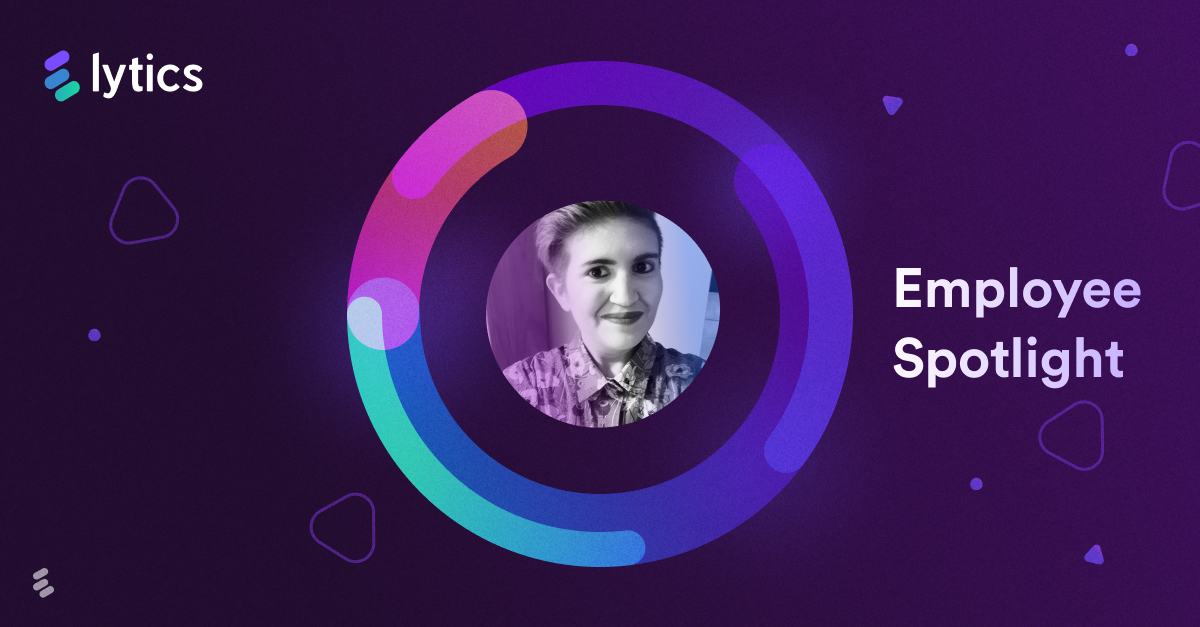Lytics Employee Spotlight | Rae Eversmann
July 12, 2023

At Lytics, we recognize that our community of employees, customers, and partners are a huge part of what makes what we do possible. Here’s a spotlight on a member of our team — and some insights on what drives their success at Lytics, in their own words.
Meet Rae Eversmann, Frontend Engineering Manager.
Explain what you do in 1-2 sentences
My name is Rae (they/them), I am the Frontend Engineering Manager, leading the Frontend Team at Lytics: a group of 5 engineers. My day-to-day includes leading our daily standup, working on customer issues, working with Product to plan and scope upcoming features, and supporting my team with any problems they face.
What inspired you to pursue a career in frontend engineering, and how did you get started in this field?
In high school, I joined the robotics team, which helped me discover my passion for engineering. I majored in Electrical and Computer Engineering at the University of Texas at Austin, intending to become a robotics researcher. However, after working a few semesters at ReNeu Robotics Lab, I became more interested in how humans (specifically non-engineers) interacted with the robots we worked on, which sparked my passion for working on User Interfaces. By my junior year at UT, after learning more about the different engineering disciples through networking with other college students, I realized that electrical engineering wasn’t the right fit for me and that computer science aligned better with my skill set. So, instead of switching majors, I graduated with my Electrical and Computer Engineering degree and decided to pursue a job as a software developer instead of going into Electrical Engineering.
However, I knew there were gaps in my knowledge because while I learned the basics of programming in college, I still needed to learn the basics of web development, so I continued my education through a coding boot camp called Hack Reactor (now called Galvinise). After graduating from the three-month intensive course, I started applying for web development jobs, eventually getting hired as a front-end engineer for a cyber security company. Under the mentorship of the UI Architect, I quickly fell in love with front-end development.
Why did you choose Lytics and how does your experience match your expectations?
The main reason I joined Lytics was the company culture. A number of the engineers I talked to had been at the company for 5+ years, which is a good sign at a tech startup as some companies have high turnover due to poor leadership. It was clear the engineers I talked to cared about Lytics.
The company’s values also aligned with mine: “Our success is built on inclusivity” and “We succeed and fail together.” These values paint a clear picture of a company that values teamwork and a sense of community rather than a company focused just on profits at the expense of its employees. My experience aligns with my expectations, a working environment built on trust, communication, and respect. Lytics has shown it cares about its employees’ well-being.
What is your proudest accomplishment at Lytics to date?
When I joined Lytics in 2022, the Frontend team was starting the move from an older framework, Ember, to use more modern technologies, React, plus a new mono repo architecture. Switching technologies like this takes a lot of effort and time.
As we started moving parts of our app to the new architecture, changing from the old look to the new one was jarring. There were two options to fix this problem:
- Rewriting the whole application
- Or updating the old UI to match the look and feel of the new UI.
If we tried to rewrite the entire application, it would likely introduce a heap of bugs, not to mention the amount of effort and time it would take. As a small startup, we did not have the resources to switch to the new architecture all at once, so I suggested a project called Revamp, which aimed to update the old UI to match the look and feel of the new UI. This project allowed us to continue to use both applications together, providing a consistent look in our application while not rewriting all the code at once but moving things over slowly, which has eased the transition to the new architecture.
What are you working on right now that excites you?
At Lytics, we’re dedicated to exploring cutting-edge AI technologies that empower our users to achieve enhanced efficiency. Currently, my main focus lies in a project centered around leveraging AI to streamline the setup of a Conductor Schema. By employing intelligent guidance, we simplify the entire process and make it more seamless for users.
I’m thrilled to be part of this endeavor as it holds tremendous potential to revolutionize the setup requirements of the Lytics Platform, ultimately enabling a more self-service approach for our valued users. The project has immense potential, not just in terms of enhancing the efficiency of the Lytics Platform but also in shaping the future of our users’ experience. Here’s why.
“By leveraging the power of AI, we aim to redefine the setup requirements and empower our users to embrace a self-service approach that places control and autonomy firmly in their hands. This groundbreaking initiative exemplifies our dedication to pushing the boundaries of innovation and our unyielding commitment to providing our users with the most advanced and user-friendly solutions. And it means we can truly revolutionize the landscape of the Lytics platform and empower our users to unlock new levels of productivity and success.”
What advice would you give to someone who is considering a career in tech?
1. Do your research and get specific.
If you’re considering a tech career, I recommend researching the different areas within tech to determine which interests you the most. It’s essential to conduct thorough research on the various specialties within the field to identify which domains you are interested in the most. Once you better understand the different areas within tech and what you’re passionate about, it’s time to start honing your skills. Online courses and coding boot camps can provide structured learning opportunities to develop technical proficiency. These resources offer a range of subjects, from programming languages to data analysis and web development.
2. Prioritize networking.
Networking is a crucial aspect of entering and thriving in the tech industry. Seek out opportunities to connect with professionals already working in the field. Attend industry events, conferences, and meetups where you can engage in conversations, gain insights, and forge valuable connections. Networking exposes you to the latest trends and advancements and opens doors to potential job opportunities or mentorship. In the fast-paced world of technology, embracing a mindset of continuous learning and adaptability is essential. The industry constantly evolves, introducing new technologies, frameworks, and methodologies.
3. Take risks and get comfortable being uncomfortable.
Don’t shy away from taking risks or exploring new things. Be open to learning and acquiring new skills, even if it means stepping outside your comfort zone. This flexibility and willingness to embrace change are vital attributes that will contribute to your long-term success in the tech industry. Remember, a tech career offers diverse opportunities, and by conducting thorough research, investing in learning, networking actively, and staying adaptable, you can pave the way for a fulfilling and thriving journey in the dynamic world of technology.
What advice would you give to aspiring engineering managers, and what qualities do you think are essential for success in this role?
If you are interested in becoming an engineering manager, I recommend contacting engineering managers you may already know and engaging in conversations with them to gain valuable insights into their experiences. It’s crucial to recognize that management is a distinct role that differs significantly from being an engineer. The skills and qualities necessary for success as a manager differ from those required as an engineer.
Effective management necessitates emotional intelligence, excellent communication skills, and empathy. As a manager, you will often find yourself engaged in challenging conversations and actively contributing to the professional growth and development of the engineers on your team. While engineers focus primarily on technical problem-solving, managers focus on optimizing productivity for their team members, which involves identifying and addressing any obstacles or inefficiencies hindering the engineers’ performance.
To excel as an engineering manager, you must cultivate strong interpersonal skills, build rapport with your team, and foster an environment of trust and support. Developing the ability to provide constructive feedback, mentorship, and guidance to your engineers will be vital in nurturing their career growth and facilitating their success. Remember, the path from engineering to management entails a shift in mindset and priorities. While you may spend less time directly involved in technical problem-solving, your focus will shift towards facilitating your team’s success by empowering them to achieve their highest potential.
______________________________________________
To explore open positions at Lytics, visit our Careers page.


